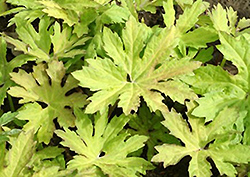It's all about ...
plants

Golden Palms Butterbur
Petasites palmatus 'Golden Palms'
Height: 18 inches
Spacing: 30 inches
Sunlight:
![]()
![]()
Hardiness Zone: 6b
Other Names: Golden Coltsfoot
Ornamental Features
Golden Palms Butterbur is primarily valued in the garden for its broadly spreading habit of growth. It features bold spikes of shell pink flowers rising above the foliage in early spring before the leaves. Its attractive enormous deeply cut lobed leaves remain gold in colour throughout the season.
Landscape Attributes
Golden Palms Butterbur is an herbaceous perennial with a ground-hugging habit of growth. Its wonderfully bold, coarse texture can be very effective in a balanced garden composition.
This is a high maintenance plant that will require regular care and upkeep, and should be cut back in late fall in preparation for winter. Gardeners should be aware of the following characteristic(s) that may warrant special consideration;
- Invasive
Golden Palms Butterbur is recommended for the following landscape applications;
- Accent
- Mass Planting
- Groundcover
- Naturalizing And Woodland Gardens
- Bog Gardens
Planting & Growing
Golden Palms Butterbur will grow to be about 18 inches tall at maturity, with a spread of 3 feet. When grown in masses or used as a bedding plant, individual plants should be spaced approximately 30 inches apart. It grows at a fast rate, and under ideal conditions can be expected to live for approximately 10 years. As an herbaceous perennial, this plant will usually die back to the crown each winter, and will regrow from the base each spring. Be careful not to disturb the crown in late winter when it may not be readily seen!
This plant does best in full sun to partial shade. It prefers to grow in moist to wet soil, and will even tolerate some standing water. It is not particular as to soil type or pH. It is highly tolerant of urban pollution and will even thrive in inner city environments. This is a selection of a native North American species, and parts of it are known to be toxic to humans and animals, so care should be exercised in planting it around children and pets. It can be propagated by division; however, as a cultivated variety, be aware that it may be subject to certain restrictions or prohibitions on propagation.
This plant is not reliably hardy in our region, and certain restrictions may apply; contact the store for more information.
